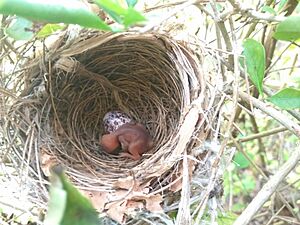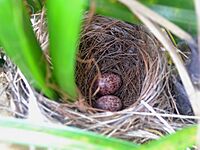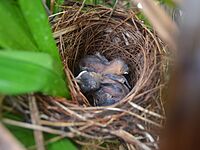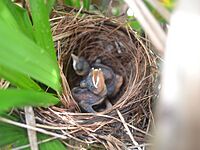Yellow-vented bulbul facts for kids
Quick facts for kids Yellow-vented bulbul |
|
|---|---|
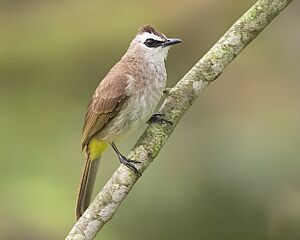 |
|
| In Singapore | |
| Conservation status | |
| Scientific classification |
|
| Kingdom: | Animalia |
| Phylum: | Chordata |
| Class: | Aves |
| Order: | Passeriformes |
| Family: | Pycnonotidae |
| Genus: | Pycnonotus |
| Species: |
P. goiavier
|
| Binomial name | |
| Pycnonotus goiavier (Scopoli, 1786)
|
|
| Script error: The function "autoWithCaption" does not exist. | |
| Synonyms | |
|
|
Script error: No such module "Check for conflicting parameters".
The yellow-vented bulbul (Pycnonotus goiavier), also called the eastern yellow-vented bulbul, is a small, active bird. It belongs to the bulbul family of passerine birds. You can find these birds living all over Southeast Asia, from countries like Indochina to the Philippines. They love open spaces like gardens and farms, but you won't usually see them deep inside a forest. They are very common birds in places where people live. Yellow-vented bulbuls often move around, not staying in one place for too long.
Contents
About the Yellow-Vented Bulbul
The yellow-vented bulbul is a well-known bird in its home region. It is known for its bright yellow patch under its tail, which gives it its name. These birds are quite adaptable and can live in many different environments. They are often seen in parks, gardens, and even cities.
What's in a Name?
Scientists give every animal a special two-part name. The yellow-vented bulbul's scientific name is Pycnonotus goiavier. It was first described by a scientist named Giovanni Antonio Scopoli in 1786. Sometimes, scientists group birds into different categories. The yellow-vented bulbul was once thought to be part of a different bird group called Muscicapa.
There are also different types, or subspecies, of the yellow-vented bulbul. These subspecies look very similar but might live in slightly different areas. For example, some live on the Malay Peninsula, while others are found in the Philippines.
Life and Habits
Yellow-vented bulbuls are busy birds. They spend their days looking for food and building nests. They are known for being quite comfortable living near people.
Home Sweet Home: Nests and Eggs
The yellow-vented bulbul builds a nest that is hard to spot. It is shaped like a deep cup and is made from things like grass, leaves, roots, and small twigs. The outside of the nest might look a bit messy, but the inside is neatly lined with soft plant fibers.
These birds can build their nests in many different places. You might find a nest in a low bush or high up in a tall tree. Since they are used to humans, they sometimes even build nests in gardens right next to houses! Female bulbuls usually lay 2 to 5 eggs. They lay their eggs between February and June.
What Do They Eat?
Yellow-vented bulbuls enjoy a varied diet. They mostly eat berries and small fruits. They also like to sip nectar from flowers. Sometimes, they will nibble on young plant shoots. Besides plants, they also eat some insects, which helps them get enough protein.
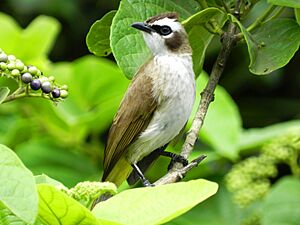
 | Shirley Ann Jackson |
 | Garett Morgan |
 | J. Ernest Wilkins Jr. |
 | Elijah McCoy |



